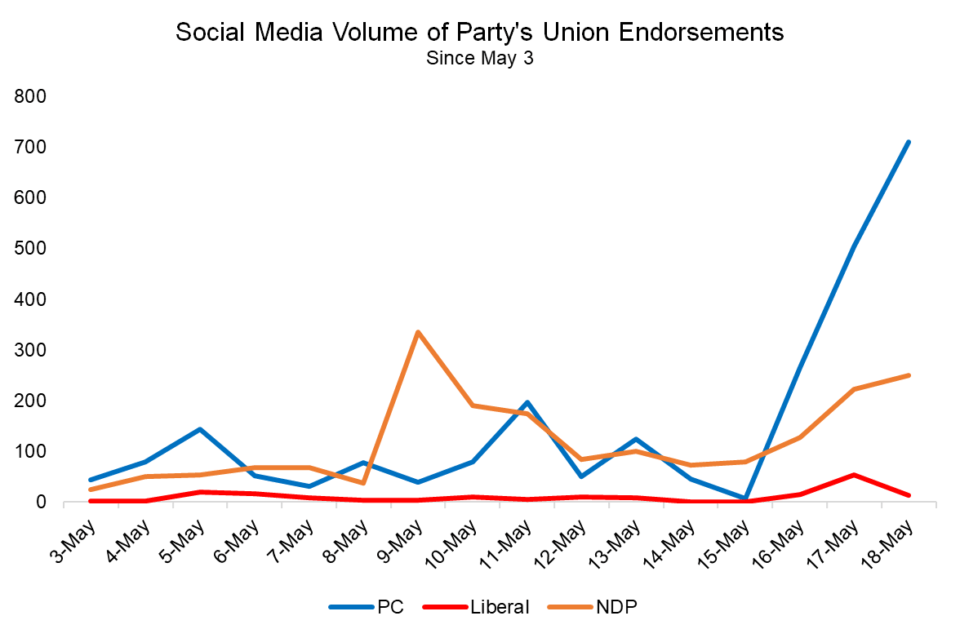It’s two weeks away from Election Day. Our major party leaders have been through the wringer with two debates, plenty of attack ads, candidate fiascos, and in the case of Horwath and Schreiner, taken out by the ultimate opponent, COVID-19.
The announcement is perhaps untimely for Horwath, who continues to drag in the polls. The latest Nanos poll has pegged the NDP at just 20 per cent, trailing the PCs at 36 per cent and the Liberals at 29 per cent. Leger’s May 18 poll also revealed 37 per cent of decided voters would vote PC, 28 per cent Liberal and 23 per cent NDP if the election were held today. BUT 46 per cent of decided voters said they may change their minds in the voting booth on Election Day.
What We’re Watching
- On Wednesday, CTV News released an article revealing that dozens of MPPs are sitting on investment properties that have generated gains of over $36.5 million. This is also not the first time the story has come up. Amid a housing crisis, these findings should be getting traction, but it remains to be seen if this second media hit will go anywhere.
- The race for a seat in Del Duca’s home riding of Vaughan-Woodbridge is heating up – or is it? We’re keenly interested in whether Del Duca will be able to beat a sitting Cabinet minister and close friend of Ford for his old seat.
- In more candidate madness, Brantford—Brant PC candidate Will Bouma is in hot water for homophobic comments in a church publication he previously oversaw. Ford defended Bouma, who put out a statement noting his support for the LGBTQ community. Liberal candidates Noel Semple in Etobicoke Centre and Audrey Festeryga in Chatham—Leamington—Kent are also under fire.
Union Endorsements
As we noted in last week’s Friday edition of The Push Back, some private sector unions have broken ranks with their fellow unions in their traditional ties with the Liberals and NDP. While OPSEU and the Ontario Federation of Labour threw their support behind the NDP, we saw more unions endorse the PCs this week. The International Union of Painters and Allied Trades (IUPAT), the International Association of Sheet Metal, Air, Rail and Transportation Workers (SMART), and the International Brotherhood of Electrical Workers (IBEW) have all thrown their support behind the PCs this week.
Some have likened this flurry of PC union endorsements to the “hard hat revolution” in the U.S. during the 1970s, which saw many union members throw their support behind Richard Nixon. While there are parallels to be drawn, Nixon’s allure was his opposition to the liberal cultural movement that had swept America over the previous decade. Similarly, Ford is racking up endorsements because of the pro-worker policies that his government introduced over the last four years, including the Working for Workers Act.
It should be noted that Ford has not won union support across the board. As noted, public sector unions have maintained their support for the left-leaning parties. Public sector support for the NDP and Liberals can partially be attributed to their platforms on organized labour, but can also be attributed to some of the setbacks that these unions have faced under the Ford government, including Bill 124 which capped public sector wages at a one per cent annual increase for three years and return to office policies.
But do union endorsements really matter? Did Ontario voters notice? Let’s look at the numbers.
Social Media Volume
The below graph shows that initially, there was limited conversation about union endorsements. Volume increased slightly for the NDP around May 9 when several of their candidates were endorsed by the Ontario Secondary School Teachers’ Federation (OSSTF). It wasn’t until May 15 that activity spiked, especially when it became clear that the PCs were going to secure endorsements from most construction unions. Yesterday, there were 710 mentions of the PCs endorsements on Twitter, dwarfing the volume seen by any of the other parties. Also of note, the Liberals have received almost no attention about their limited union endorsements, which is unusual given how heavily unions supported the Liberals in the 2014 and 2018 elections.

Push Back Verdict – Bark Worse than Bite
Last week, we concluded that the effects of the union endorsements “can’t be seen.” To some extent, this is still true. By severely limiting the advertising power of unions and third parties in 2018, they no longer have the power they once did to influence voters. The biggest effect that unions still have is their ability to mobilize their members to knock on doors, make phone calls and get out the vote on election day. It’s unclear whether the pro-PC private sector unions are better organized than the “anything but conservative” public sector unions. For the time being, our insights show that PC endorsements have mattered more to voters and we’re fielding research next week to test our hypothesis further. Stay tuned for that update.
Suffice it to say, if Ford and the PCs can continue to effectively push back on the old narrative of the PCs being anti-labour, build on the momentum the party has seen this week and effectively position the PCs as the working-class party of this election, it will be difficult for the Liberals or NDP to beat him on Election Day.
Have any questions about the news out of Queen’s Park this week? Please reach out to our political experts at info@navltd.com.

